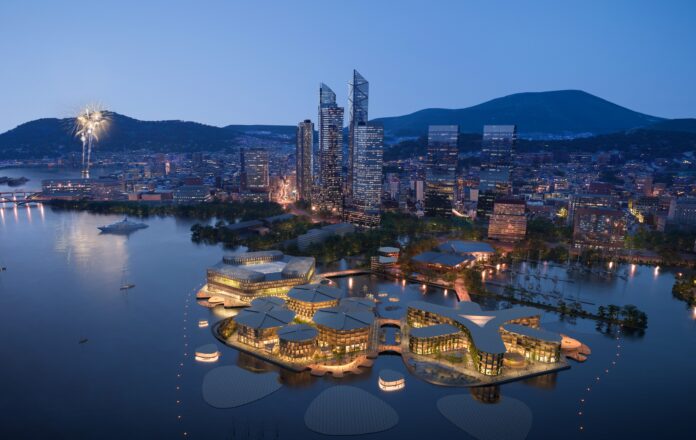California is home to The Seasteading Institute, a nonprofit that was founded in 2008 to develop seasteads, floating ocean platforms where humanity could begin to create sustainable ocean-based micronations and cities where new social and technology experimentation could thrive. An outcome of the libertarian mindset of billionaire Silicon Valley entrepreneurs like Peter Thiel, seasteading projects have risen and fallen over time just like the ocean tides. Projects have started and many have not come to fruition in places like Panama, Florida, The Phillippines, Singapore, San Francisco, and Brazil. One called Freedom Haven has plans to become the first micronation permanently at sea with permanent nation-to-nation relationships established with other countries.
But libertarian ideas are not the sole reasoning behind seasteading and floating cities. A prototype floating community is planned on the water next to Busan, South Korea. For the company that is creating it, Oceanix, it is about addressing the coastal community climate challenge of rising sea levels. Rather than building dikes and sea walls to hold back the ocean, Oceanix is offering a city that floats. So instead of increased sunshine day flooding along the US eastern seaboard that inundates Miami, Fort Lauderdale, Charleston, Norfolk, Hampton Roads and other Chesapeake Bay communities quite regularly these days, there would be cities that ride the surface of the ocean rather than be flooded by it.
It’s not like people haven’t been living in floating accommodation for decades. Houseboat communities here in Toronto have been around for a number of years. I visited one of these homes a few years ago and was surprised to see the quality of accommodation and the lifestyle it supported. Today, there are people living permanently on cruise ships that travel the globe. And in The Netherlands, boats and retired ships moored along its many canals have been turned into permanent homes often featured in HGTV’s House Hunters International. But it is in low-lying coastal areas like Bangladesh, The Maldives, and many Pacific island nations where the floating city is seen as a climate change solution for encroaching seas.
Itai Madamombe, of Oceanix, told The Economist recently that the prototype for the community to be built off Busan will cost an estimated $200 million US. Initially housing up to 500, the plan is to grow to a community of 10,000. Oceanix Busan plans to be self-sustaining producing net-zero energy from solar, wind, and the motion of the sea. It will rely on harvested freshwater from a variety of sources. All waste will be fully recycled or reused using closed-loop processes. The community will grow its own food using vertical permaculture soil-less farms.
What will be used to build Oceanix Busan? It’s called biorock, a marine material with characteristics similar to cement. But unlike cement production which is energy-intensive and highly polluting, biorock is manufactured by using electrodes immersed in seawater and the application of a low-yield electric current. The current causes minerals in the seawater to accrete to the electrodes creating what is essentially limestone. It’s stronger than cement and doesn’t require added rebar, so there is no rust or carbonation in the material to weaken it. And biorock as it ages grows stronger and accretes naturally through interaction with the sea growing over time.
Oceanix Busan is not an experiment in libertarian values. It is not an attempt to create a micronation. Rather it is a planned community that will be part of Busan. Its developers hope to learn from the prototype to create a new marine industry focused on building floating cities for the rest of the world.
Chris Smedley, of Toronto-based Digital Habitats, believes that floating cities will not just answer the challenge of rising sea levels, but serve as aquaports to provide offshore support for marine shipping, rocket-based transportation networks, and ocean environment protection zones, theme parks and cruise destinations. Chris is currently working on developing aquacity and aquaport models for future Indian Ocean communities.















